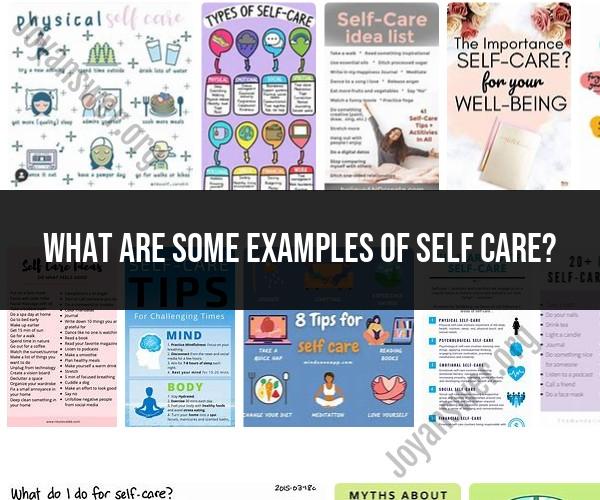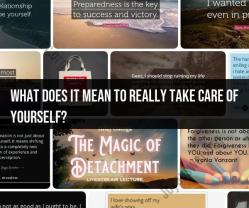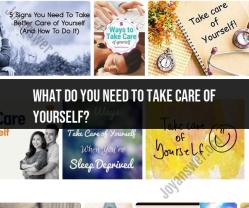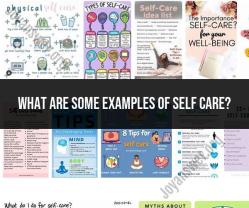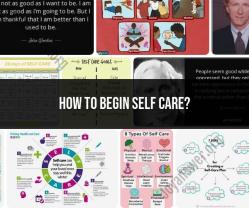What are some examples of self care?
Self-care encompasses a wide range of activities and practices that nurture your physical, emotional, and mental well-being. Here are some examples of self-care activities to consider:
Physical Self-Care:
Regular Exercise: Engage in physical activities you enjoy, whether it's going for a walk, practicing yoga, or participating in team sports.
Healthy Eating: Nourish your body with a balanced diet that includes plenty of fruits, vegetables, lean proteins, and whole grains.
Adequate Sleep: Prioritize getting enough sleep to ensure your body and mind are well-rested and ready for the day ahead.
Hydration: Drink enough water throughout the day to stay properly hydrated.
Relaxation Techniques: Practice relaxation exercises like deep breathing, progressive muscle relaxation, or taking warm baths to reduce stress and tension.
Limiting Screen Time: Set boundaries on screen time, especially before bedtime, to improve sleep quality.
Emotional Self-Care:
Journaling: Write down your thoughts, feelings, and experiences in a journal to gain clarity and process your emotions.
Creative Outlets: Engage in creative activities like painting, writing, or playing a musical instrument to express yourself.
Positive Affirmations: Use positive affirmations to boost self-esteem and foster a positive self-image.
Gratitude Practice: Keep a gratitude journal or simply take time each day to reflect on the things you're grateful for.
Setting Boundaries: Learn to say no when necessary and set healthy boundaries to protect your emotional well-being.
Mental Self-Care:
Reading: Read books, magazines, or articles that interest you or challenge your thinking.
Learning: Pursue educational opportunities, take up a new hobby, or engage in lifelong learning.
Mental Stimulation: Engage in puzzles, brain teasers, or games that stimulate your mind.
Mindfulness Meditation: Practice mindfulness to stay present in the moment and reduce stress.
Therapy or Counseling: Seek professional help when needed to address mental health concerns or life challenges.
Social Self-Care:
Quality Time with Loved Ones: Spend time with family and friends who provide support and connection.
Social Activities: Participate in social gatherings, clubs, or events that align with your interests.
Support Groups: Join a support group for individuals experiencing similar challenges or life transitions.
Connecting Virtually: Maintain social connections through virtual means, especially when in-person interaction is limited.
Relaxation and Recreation:
Vacation or Getaway: Plan occasional trips or vacations to relax and recharge.
Nature Time: Spend time in nature, whether it's hiking, camping, or simply taking walks in the park.
Entertainment: Enjoy leisure activities like watching movies, attending concerts, or visiting museums.
Massage or Spa Day: Treat yourself to a massage or spa day to relax and relieve stress.
Practical Self-Care:
Time Management: Organize your schedule, set priorities, and allocate time for self-care activities.
Decluttering: Tidy up your living space to create a more organized and stress-free environment.
Financial Planning: Take steps to manage your finances and reduce financial stress.
Professional Development: Invest in your career by attending workshops or seeking career advancement opportunities.
Remember that self-care is highly individual, and what works for one person may not work for another. It's essential to listen to your own needs and preferences and tailor your self-care routine accordingly. The key is to regularly incorporate self-care practices into your life to promote overall well-being and resilience in the face of life's challenges.
Examples of Self-Care Activities for the Mind and Body
Here are some examples of self-care activities for the mind and body:
- For the mind:
- Meditation
- Yoga
- Journaling
- Reading
- Spending time in nature
- Listening to music
- Learning a new skill
- Spending time with loved ones
- For the body:
- Getting enough sleep
- Eating a healthy diet
- Exercising regularly
- Taking a warm bath or shower
- Getting a massage
- Taking a walk in nature
- Getting enough sunlight
- Getting regular checkups and screenings from your doctor
Easy Self-Care Ideas to Reduce Stress and Nurture Yourself
Here are some easy self-care ideas to reduce stress and nurture yourself:
- Take a few deep breaths. This is a simple but effective way to calm your mind and body.
- Stretch. Stretching can help to relieve muscle tension and improve your flexibility.
- Take a break. If you are feeling overwhelmed, take a few minutes to relax and clear your head. Go for a walk, listen to music, or read a book.
- Do something you enjoy. Make time for activities that you find enjoyable and relaxing. This could be anything from reading to watching your favorite movie to spending time with loved ones.
- Say no. It is okay to say no to things that you don't have time for or that you don't want to do. Don't feel guilty about setting boundaries and protecting your time and energy.
Fun and Relaxing Self-Care Ideas to Try at Home
Here are some fun and relaxing self-care ideas to try at home:
- Give yourself a spa treatment. Take a warm bath or shower, light some candles, and put on some calming music. You can also give yourself a facial, manicure, or pedicure.
- Read a book or magazine. Curl up on the couch with a good book or magazine and get lost in another world.
- Watch a funny movie or TV show. Laughter is a great way to reduce stress and improve your mood.
- Listen to music. Put on your favorite music and dance around the living room, or simply relax and enjoy the music.
- Play games. Board games, video games, and card games can be a fun and relaxing way to spend time with loved ones or by yourself.
- Spend time in nature. If you have a backyard, sit outside and enjoy the fresh air and sunshine. If you don't have a backyard, go for a walk in a park or nature preserve.
Self-care is important for everyone, but it is especially important for people who are living with stress, anxiety, or depression. By taking care of yourself, you are better able to manage your symptoms and live a happy and fulfilling life.
